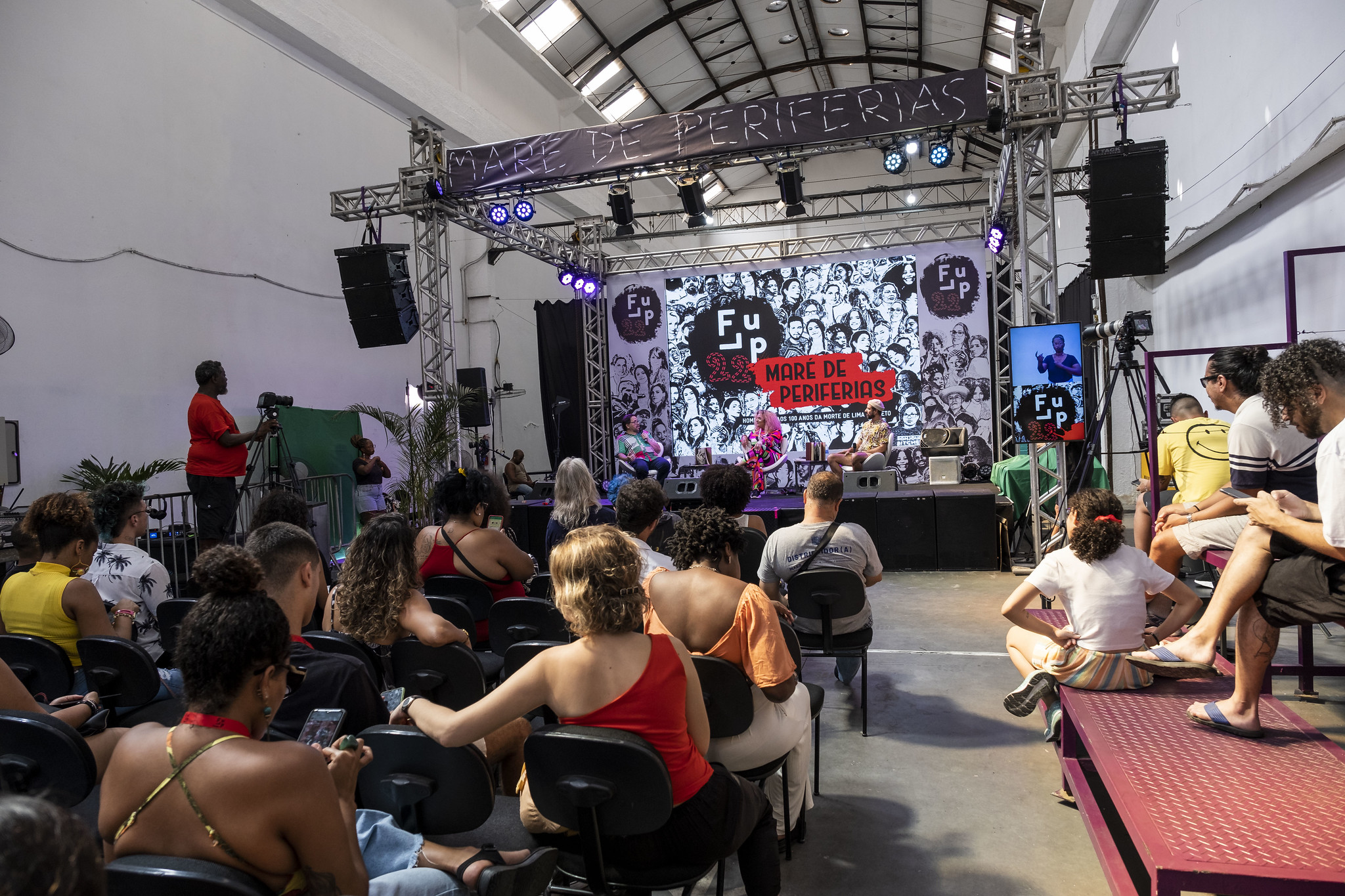
The Urban Peripheries Literary Festival, commonly known as FLUP, is an international literary event held in the favelas and peripheries of Rio de Janeiro—areas traditionally excluded from literary fair circuits and book festivals. In 2022, the 12th edition of the event took place at the Maré Arts Center (CAM), located in the North Zone favela of Nova Holanda in the Maré Complex, from December 5 to 11. The title chosen for FLUP 2022 was Maré de Periferias, a play on the name of the host community, meaning “tide of peripheries.”

The event has previously been held in the favelas of Prazeres, Vidigal, Babilônia, Mangueira, and in 2019 was held at the Rio de Janeiro Museum of Art (MAR). During the pandemic, the event was taken online, returning to in-person at the 2022 edition.
“All those involved in the 12th edition of FLUP worked to blur the boundaries that distance Brazil or bring it closer to Maré. But there’s no denying that much more than defining what’s at the center and what’s on the edge [of the city], it’s this division that allows the State to come here with tanks, rifles and boots at the door in a genocidal disrespect [for residents] which will someday be condemned by history.” — Julio Ludemir, general director of FLUP
In the introduction letter and invitation to the event, Ludemir expressed hope that FLUP will reach all audiences: “May FLUP invade Brazil. May Brazil invade Maré. And in these ebbs and flows, may we finally erase the fictitious lines that separate us from ourselves.”
The event held a series of debates with the title Quilombo do Lima with the intention of celebrating writer Lima Barreto. There were also launches of literary works and various musical performances as well as the semi-finals and finals of the National Slam and School Slam poetry competitions.
On the first day, the festival opened with a beautiful ceremony Saluting the Orixás, reaffirming the commitment to anti-racist struggles and religious freedom. Following the opening ceremony was the launch of the book Pai Santana, the Orixá of Soccer by Ecio Salles, author and also one of the founders and organizers of FLUP, who passed away in 2019. The book was Salles’ final intellectual work and is a biography of Eduardo Santana, known as Pai Santana, former masseur at the Vasco da Gama sports club and an important figure with respect to religions of African origin.
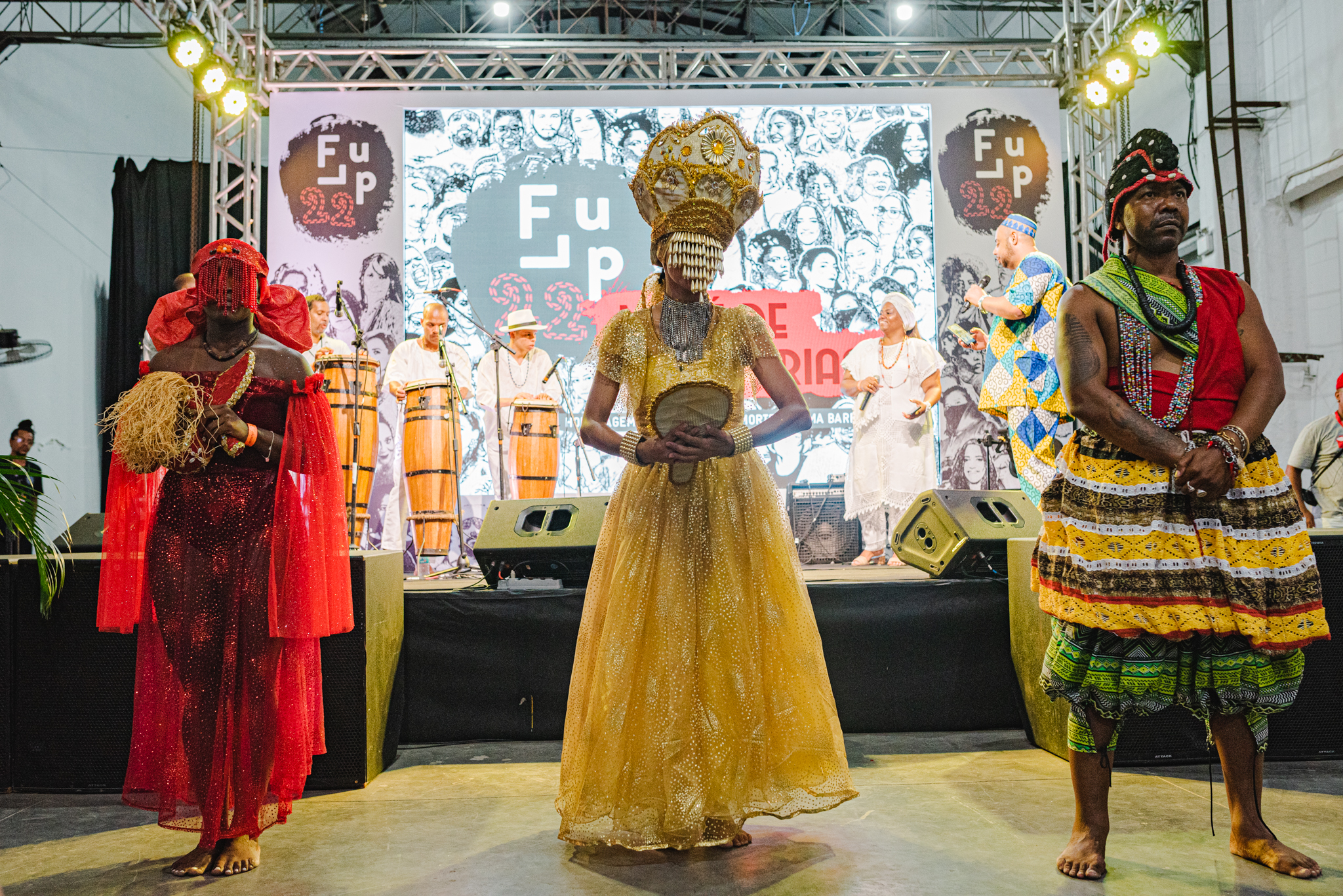
The first day of FLUP closed with a lot of music, including performances by Bahian trapper Evy, singer Kamy, and pagode group No Lance. There was also a samba circle performance by group Awurê which was created with the aim of celebrating and reclaiming the importance of African influence in Brazilian culture, identity, and ancestral awareness.
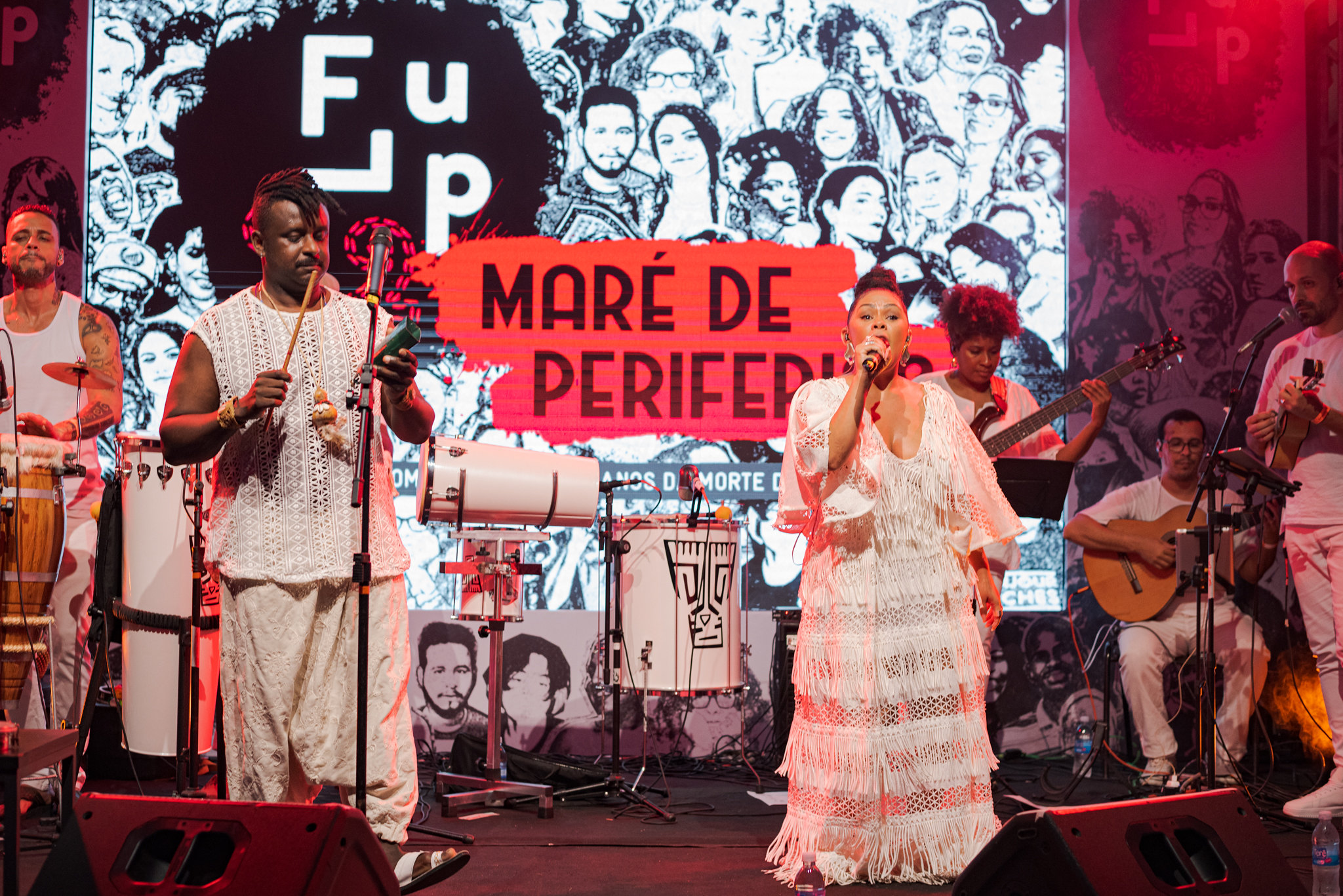
The second and third days of the event were filled with poetry, featuring the opening and qualifying rounds of the National Slam competition on December 6 and the final of the Maré School Slam on December 7, won by poet and Maré resident Stacy Ferreira. Math de Araújo—School Slam mentor, poet and writer from Maré—said it was a surprise to be invited to participate in the project. He had the task of orienting other poets from two different groups, one from Redes da Maré and another from Fight for Peace:
“I was remembering how I became interested [in poetry], so it was almost like a return to my past to see these young people that are just starting… Slam is just a game to grab attention. The real purpose is what comes beyond it. We write poetry from the need to translate and think about our reality.”
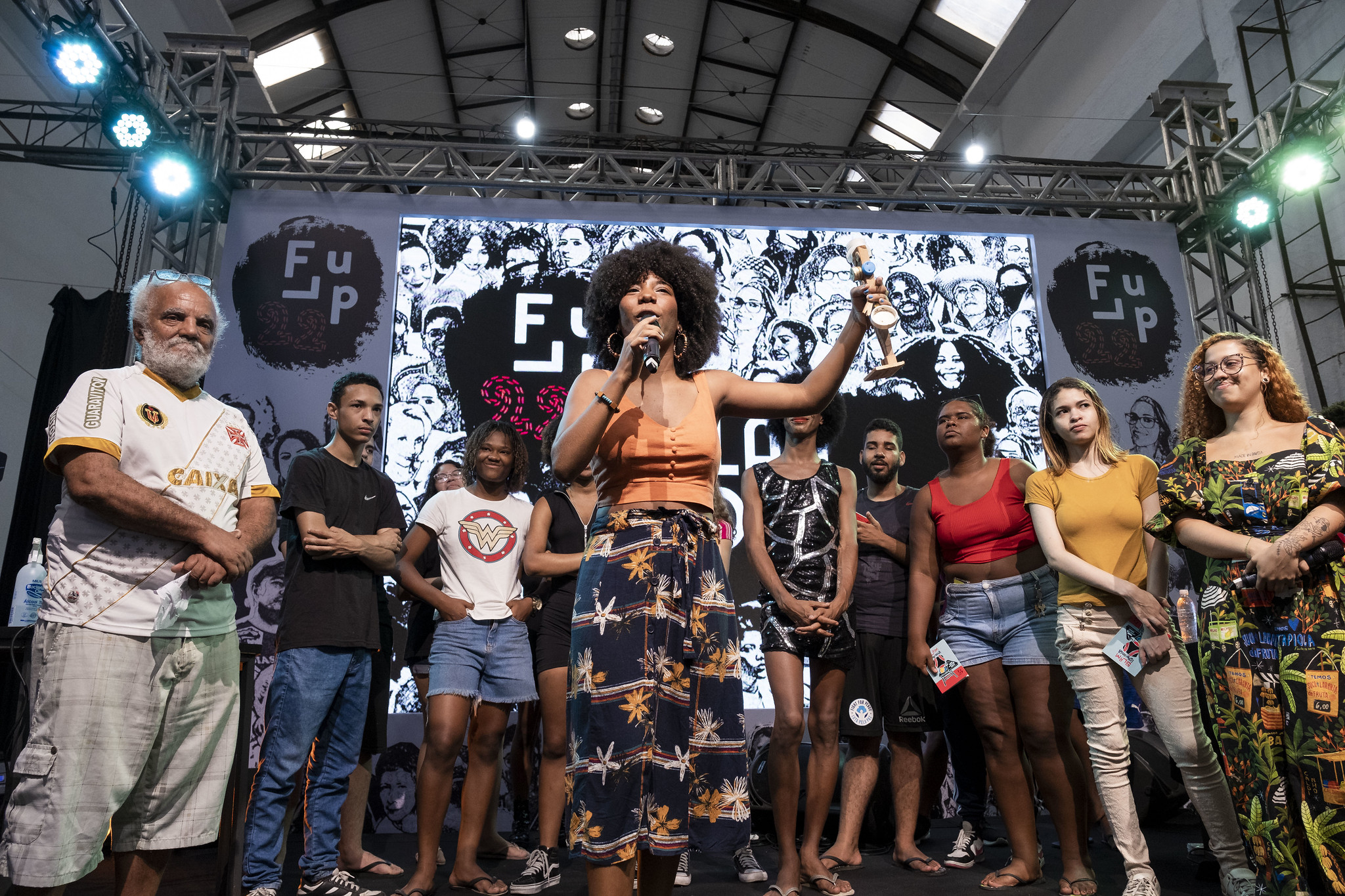
On the same day the event held the roundtable Intimate Diary: When Writing Itself Translates the World. The discussion was mediated by Angélica Ferrarez and included the participation of Conceição Evaristo, multi-award-winning Brazilian author, and Yanick Lahens, Haitian author and winner of the Prix Femina for her novel Moonbath. The event closed with samba and poetry performances with Lucas Afonso and Nova Raiz do Samba.
The following days of the festival—December 8, 9, and 10—featured performances and competitions with a lot of poetry as FLUP hosted the semi-finals and finals of the Brazilian Championship of Spoken Word Poetry Slam BR.
The roundtable Cemetery of the Living: Variations on Necropolitics featured writers Geovani Martins and Jessé Andarilho. The discussion was mediated by Thais Custodio, an economist born and raised in Maré with a degree from the State University of Rio de Janeiro (UERJ), currently studying for a master’s in Regional Economy and Development at the Rural Federal University of Rio de Janeiro (PPGER-UFRRJ) and coordinator of the Network of Black Economists (REPP).
“This issue runs through the life of any Black person or favela resident. Bringing this theme to FLUP with other favela residents making up the panel was very gratifying because we re-signified this debate, which is always very painful, heavy, and crushing.” — Thais Custodio
All the roundtable discussions had the strong objective of opening up the discussion for those present, but also of making sure that every debate went outside the event and was shared by each person in their respective territories so as to go beyond academic discourse.

The final day of the festival featured some very moving and special moments. The program started with the roundtable Miró da Muribeca: For a Messy Poetry with author Marcelino Freire and poet Luna Vitrolira.
The following debate—titled Clara dos Anjos: We Didn’t Know that the Name for This Is Abuse, referencing the title of a short story by Lima Barreto—was mediated by journalist Flávia Oliveira and featured journalists Audrey Pulvar from Martinique and Marilene Felinto from Brazil. The roundtable was intended to discuss the excessive incidences of violence against women, especially against the body of the Black woman.
Following this, in one of the most anticipated moments in the entire FLUP program, Federal Deputy Renata Souza and Anielle Franco, sister of Marielle Franco and as of January 2023 Brazil’s Minister of Racial Equality, were alongside Fernanda Vianna to debate activism and politics. After the discussion came the launch of the book My Sister and I: Diaries, Memories and Conversations, by Anielle Franco which has the main intention of sharing sentiments and speaking of the loss and grief following Marielle’s assassination in 2018. Marinete da Silva, Marielle and Anielle’s mother, was present in the audience.
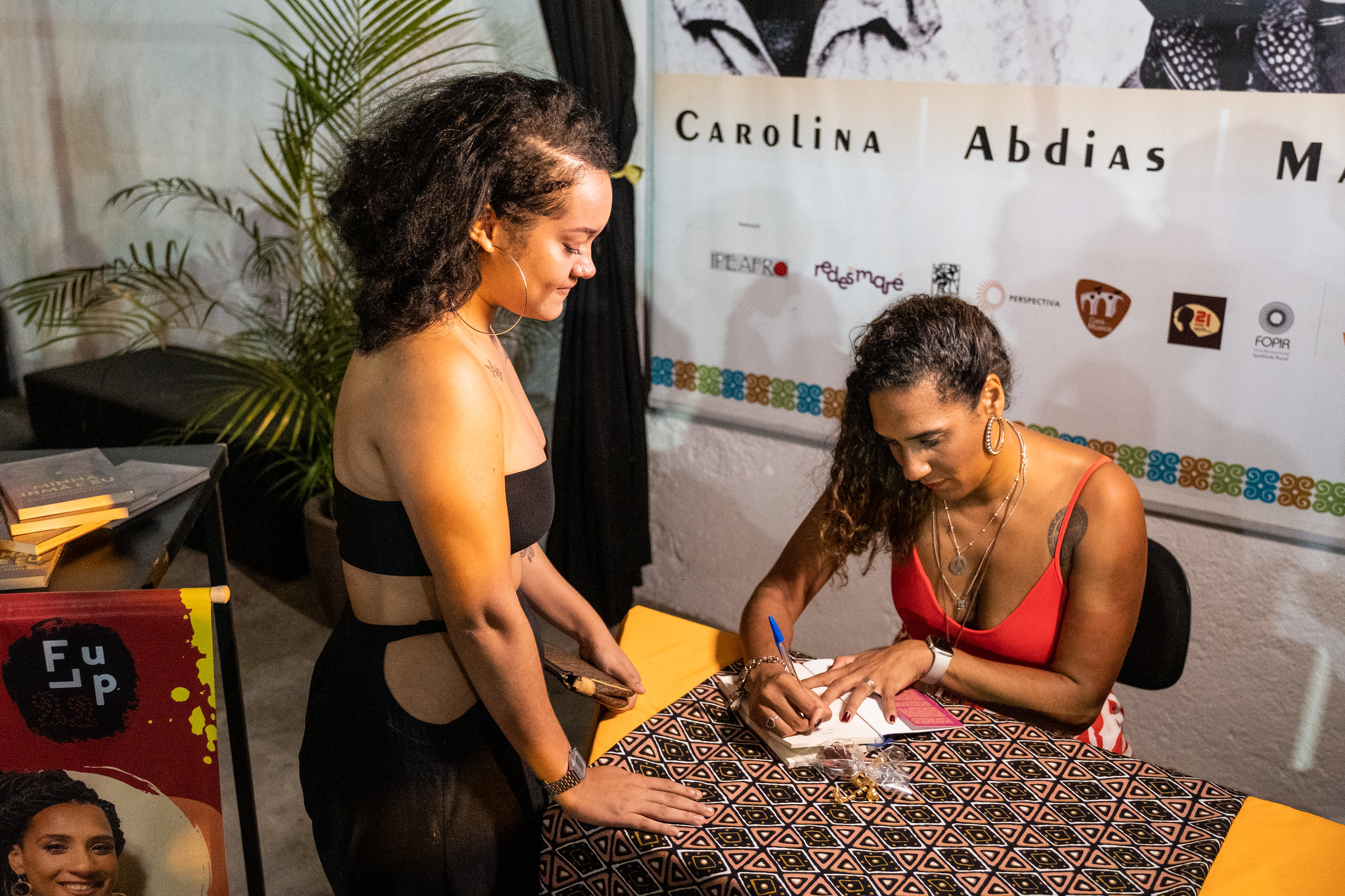
Rayanne Soares, 25, university student and resident of Rubens Vaz in Maré said:
“I think it’s fundamental that FLUP, as an urban peripheries literary festival, has brought Marielle into the program via Black women from different areas. Marielle is the personification of this daily struggle for women, who are the majority but are so poorly represented and placed in society.
“Having Marielle as a reference, as a personification, being spoken about and debated in this way is of utmost importance because it’s women speaking about women for women on what they face in a particular moment for the simple fact of being a Black woman in a racist and patriarchal society.”
The night closed once again with musical performances, featuring artists Gutierry, Nizaj, MC Natalhão, and Banda Agona. Rapper N.I.N.A. do Porte closed the event with a final flourish performing hit songs such as A Bruta, A Braba, A Forte.
“I was totally hooked and delighted with the people there. In Maré there are a lot of talented people with potential, but above all it’s really good to see these faces. It’s good when we hear these people talk about their journey… It’s really important to highlight just how relevant it is to have events like this one here [in Maré]. It brings visibility and means people get to know us and see that we are poetry too, that we consume and produce literature. Our lived experiences are poetic. Being at FLUP this year has sparked a desire to go to all the cultural events I can here in Maré.” — Karollyne Silva, 25, Maré resident

The World Cup happened at the same time as the festival, with Brazil games happening on some of the same days. FLUP ensured the matches were shown in the middle of the traditional program, understanding that in Brazil, soccer and culture walk side by side.
About the author: Juliana Pinho is a resident of Nova Holanda, one of the favelas that make up Complexo da Maré, and is a sociologist (UFRJ) and journalism student (UCAM). A popular communicator and community organizer, Pinho co-founded the Maré Mobilization Front, is a member of the Palafitas Agency, and is responsible for management and planning of the For Her project. Currently, she manages NGO Fight For Peace‘s portfolio and is a reporter for the Entretetizei portal.
